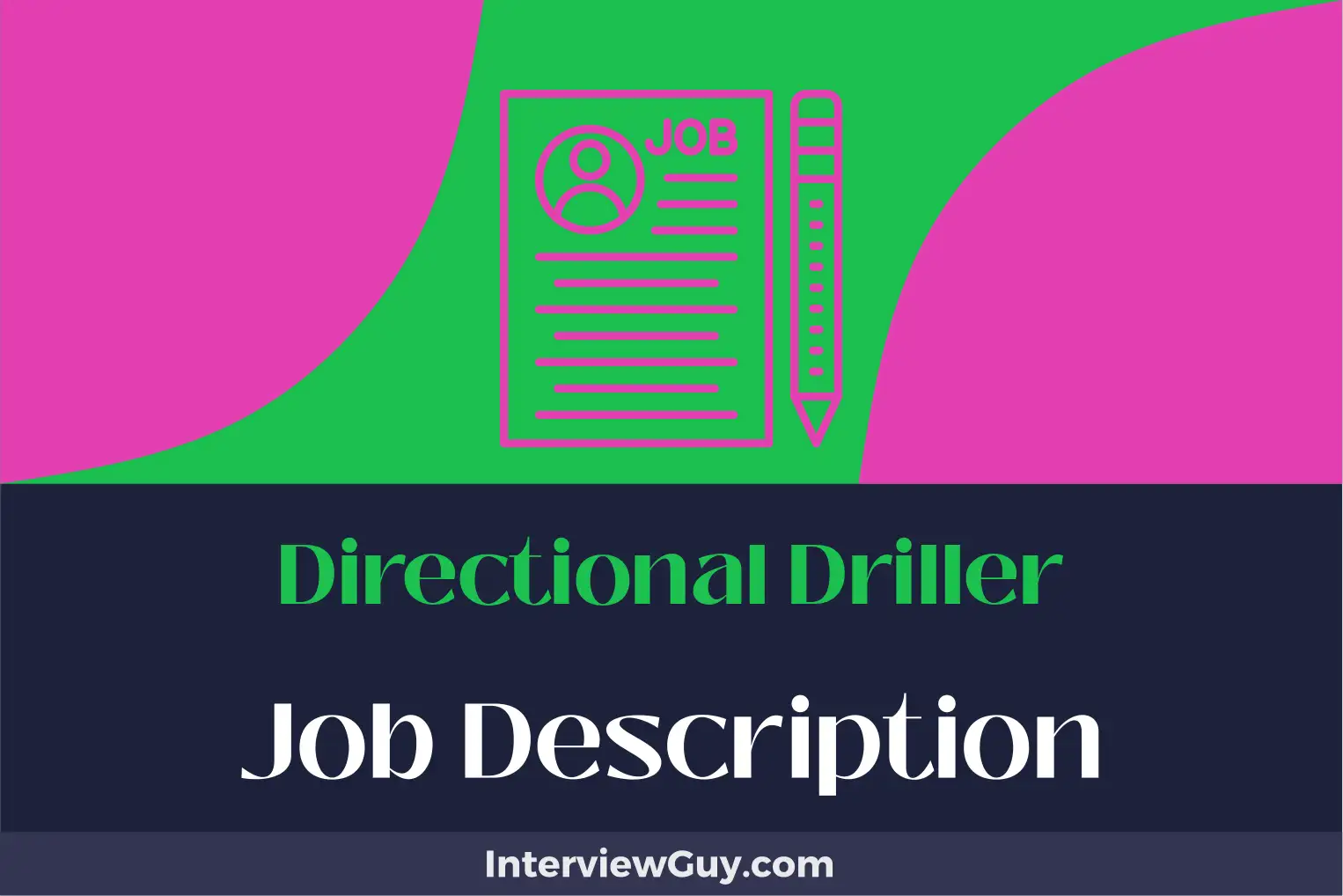Directional Driller Job Description [Updated for 2026]

In this technological era, the spotlight on directional drillers has never been more significant.
As we forge ahead in the energy industry, the demand for skilled individuals who can efficiently navigate, expand, and secure our drilling operations increases with each advancement.
But let’s delve deeper: What exactly is expected from a directional driller?
Whether you are:
- A job seeker trying to decipher the intricacies of this role,
- A hiring manager outlining the characteristics of the ideal candidate,
- Or simply fascinated by the world of directional drilling,
You’ve come to the right place.
Today, we present a customizable directional driller job description template, designed for effortless posting on job boards or career websites.
Let’s dive right in.
Directional Driller Duties and Responsibilities
Directional Drillers play a crucial role in the oil and gas industry, employing specialized techniques to drill wells on an angle, instead of drilling vertically.
Their work allows for the extraction of oil and gas from sites that would otherwise be inaccessible.
Their duties and responsibilities include:
- Planning and executing drilling operations in line with project specifications
- Operating and maintaining drilling equipment such as drill bits and drill strings
- Working in collaboration with geologists to determine the best drilling methods
- Analyzing drilling data and making necessary adjustments to drilling operations
- Monitoring drilling fluid systems and taking action to correct any issues
- Ensuring adherence to safety procedures and protocols to prevent accidents and minimize risk
- Providing technical support and guidance to drilling teams
- Documenting drilling operations including equipment usage, drilling depth, and geological findings
- Conducting tests to determine the presence of oil and gas
- Working to limit environmental impact of drilling
Directional Driller Job Description Template
Job Brief
We are seeking a skilled directional driller to join our team.
In this role, you will be responsible for drilling the paths of underground utilities and pipelines.
You will also be expected to prepare drilling plans, analyze drilling conditions, maintain drilling equipment, and follow safety regulations.
Our ideal candidate has prior experience in directional drilling, a strong understanding of drilling procedures, and excellent problem-solving abilities.
Responsibilities
- Plan and execute directional drilling operations.
- Analyze geological data to anticipate drilling conditions.
- Operate and maintain drilling equipment and ensure its functionality.
- Adhere to safety standards and regulations.
- Monitor drilling progress, prepare drilling reports and make necessary adjustments to ensure the operation runs smoothly.
- Work collaboratively with engineers and technical staff to ensure project success.
- Maintain a clean and organized work area.
- Train and mentor less experienced drilling personnel.
- Ensure compliance with environmental policies.
Qualifications
- Proven experience as a directional driller.
- Knowledge of drilling procedures and safety regulations.
- Ability to interpret geological data.
- Excellent problem-solving abilities.
- Strong communication and teamwork skills.
- Physical stamina and strength to handle heavy equipment.
- High school diploma or equivalent. Additional certification or diploma in drilling or a related field is a plus.
Benefits
- 401(k)
- Health insurance
- Dental insurance
- Retirement plan
- Paid time off
- Opportunities for advancement
Additional Information
- Job Title: Directional Driller
- Work Environment: Field work with regular exposure to outdoor weather conditions. This position may require long hours and travel.
- Reporting Structure: Reports to the Drilling Supervisor or Project Manager.
- Salary: Salary is based upon candidate experience and qualifications, as well as market and business considerations.
- Pay Range: $50,000 minimum to $85,000 maximum
- Location: [City, State] (specify the location or indicate if remote)
- Employment Type: Full-time
- Equal Opportunity Statement: We are an equal opportunity employer and value diversity at our company. We do not discriminate on the basis of race, religion, color, national origin, gender, sexual orientation, age, marital status, veteran status, or disability status.
- Application Instructions: Please submit your resume and a cover letter outlining your qualifications and experience to [email address or application portal].
What Does a Directional Driller Do?
Directional Drillers play a crucial role in the oil and gas industry, primarily working for drilling contractors or oil exploration companies.
They are responsible for the navigation and accurate positioning of oil and gas wells.
They work closely with other drilling team members to design and implement drilling plans.
Their job primarily involves the utilization of specialized drilling equipment and software to steer the wellbore in a direction specified by the drilling plan.
They continuously monitor drilling parameters and make real-time adjustments to the drilling direction.
They analyze drilling data and provide expert advice on how to optimize the drilling process.
They also have to ensure that drilling operations are carried out safely, effectively, and in compliance with environmental regulations.
Directional Drillers are also responsible for troubleshooting any technical issues that may arise during the drilling process, and they regularly communicate their findings and actions to the drilling team and management.
In addition, they may also be involved in training and mentoring less experienced members of the drilling team.
Directional Driller Qualifications and Skills
A proficient Directional Driller should possess a set of technical and soft skills that align with the requirements of the role.
These include:
- Extensive technical knowledge and understanding of drilling equipment, procedures, and technologies to execute directional drilling plans accurately and efficiently.
- Strong analytical skills to interpret drilling conditions and geological data for decision-making and problem-solving during drilling operations.
- Physical stamina and strength to handle heavy drilling equipment and endure long hours of work under challenging environmental conditions.
- Excellent communication skills to effectively liaise with drill crew members, geologists, and engineers, ensuring all drilling procedures are understood and carried out correctly.
- Ability to work under pressure and make critical decisions during emergencies or unexpected incidents during drilling operations.
- Detail-oriented approach to monitor drilling parameters and equipment status, ensuring safety and efficiency in operations.
- Knowledge of health and safety regulations in the drilling industry, ensuring adherence to protocols to maintain a safe working environment.
- Experience in using computer-aided design (CAD) and other software systems for planning and controlling drilling trajectories.
Directional Driller Experience Requirements
Directional Drillers typically start their careers in entry-level roles in the drilling industry to gain basic knowledge and experience.
The initial years are usually spent in jobs such as a Driller’s Assistant or Roughneck, where they familiarize themselves with drilling equipment and procedures.
Candidates with 2 to 3 years of experience in the drilling industry may be considered for the role of Directional Driller.
During these initial years, they gain hands-on experience in drilling operations, learn about borehole conditions, and grasp the principles of directional drilling technology.
Experienced candidates with more than 5 years in the drilling industry are often preferred for advanced Directional Driller roles.
At this stage, they are expected to have comprehensive knowledge of tools like Measurement While Drilling (MWD) and Logging While Drilling (LWD).
They should also be adept at handling complex drilling projects and coordinating with different departments.
For those with more than 7 years of experience, they may be considered for supervisory or managerial roles, where they oversee the entire drilling operation, manage teams, and ensure safety standards are met consistently.
These professionals often possess strong leadership skills, technical expertise, and problem-solving abilities.
Advanced certifications in drilling and safety procedures, along with a strong track record in the industry, can also enhance a Directional Driller’s career prospects and prove their competency for higher roles.
Directional Driller Education and Training Requirements
A Directional Driller typically requires a high school diploma or its equivalent, along with a substantial period of on-the-job training.
Many employers prefer candidates with an associate’s degree or bachelor’s degree in a field related to drilling, such as petroleum engineering or geology, although work experience is often more critical.
Along with formal education, they need a strong background in horizontal and directional drilling, including understanding of drilling engineering and geological formations.
Extensive training in the use of drilling equipment, safety procedures, and emergency response is also required.
This training is often provided on the job, but some companies may require completion of a certified training program.
Additional certifications, such as well control certification, might be required depending on the employer or location of the work.
Advanced roles may require a master’s degree in petroleum engineering or a related field.
Continuing education is important in this field due to the constantly evolving technology and methods used in drilling operations.
A successful Directional Driller also needs strong problem-solving skills, physical stamina, and the ability to work under stressful conditions.
Directional Driller Salary Expectations
A Directional Driller earns an average salary of $74,583 (USD) per year.
This salary can vary depending on factors such as experience, the complexity of the drilling project, and the location of the job.
Directional Driller Job Description FAQs
What skills does a Directional Driller need?
Directional Drillers need to be highly skilled in drilling techniques and machinery, with a solid understanding of geology and drilling operations.
They must also possess excellent problem-solving skills, strong physical stamina, and the ability to work under high-pressure conditions.
Good math and computer skills are also required to interpret drilling data and make accurate calculations.
Do Directional Drillers need formal education?
While a high school diploma or equivalent is typically required, most of the skills needed by Directional Drillers are learned on the job.
However, a degree or courses in geology, petroleum engineering, or a related field can be beneficial.
Prior experience in drilling operations is usually required, and some employers may require certification in drilling.
What should you look for in a Directional Driller’s resume?
Look for a solid work history in drilling operations, showcasing their experience with different drilling techniques and machinery.
Certifications in drilling can also be an asset.
Additionally, look for evidence of problem-solving skills, ability to work under pressure, and physical stamina.
What qualities make a good Directional Driller?
A good Directional Driller is highly detail-oriented and precise, as accuracy is crucial in this job.
They should also be dependable and able to work long hours under challenging conditions.
Problem-solving skills are key, as they need to quickly address any issues that arise during drilling operations.
They must also have good interpersonal skills to communicate effectively with the drilling team and other staff.
Is it difficult to hire Directional Drillers?
Hiring Directional Drillers can be challenging due to the specialized skills and experience required for the job.
The nature of the job also demands individuals who are willing to work in physically demanding and high-pressure conditions, often in remote locations.
Therefore, it is crucial to offer competitive compensation and benefits to attract and retain qualified candidates.
Conclusion
So there you have it.
Today, we tunneled deep into the core of what it truly means to be a directional driller.
And guess what?
It’s not just about drilling holes.
It’s about shaping the path beneath our feet, one drill at a time.
With our go-to directional driller job description template and real-world examples, you’re all set to make your mark.
But why stop there?
Explore further with our job description generator. It’s your next step to creating precise job listings or crafting your resume to perfection.
Remember:
Every drill is an integral part of a larger project.
Let’s shape that path. Together.
How to Become a Directional Driller (Complete Guide)
Ease Into Earnings: The Low-Stress Way to Make a Living
Discover the Unusual: Fun Jobs That Also Offer Great Pay


![Digital Electronics Engineer Job Description [Updated for 2026]](https://interviewguy.com/wp-content/uploads/2024/05/digital-electronics-engineer-job-description-768x512.webp)

![Catering Assistant Job Description [Updated for 2026]](https://interviewguy.com/wp-content/uploads/2024/02/catering-assistant-job-description-768x512.webp)

![Dutch Language Teacher Job Description [Updated for 2026]](https://interviewguy.com/wp-content/uploads/2024/05/dutch-language-teacher-job-description-768x512.webp)